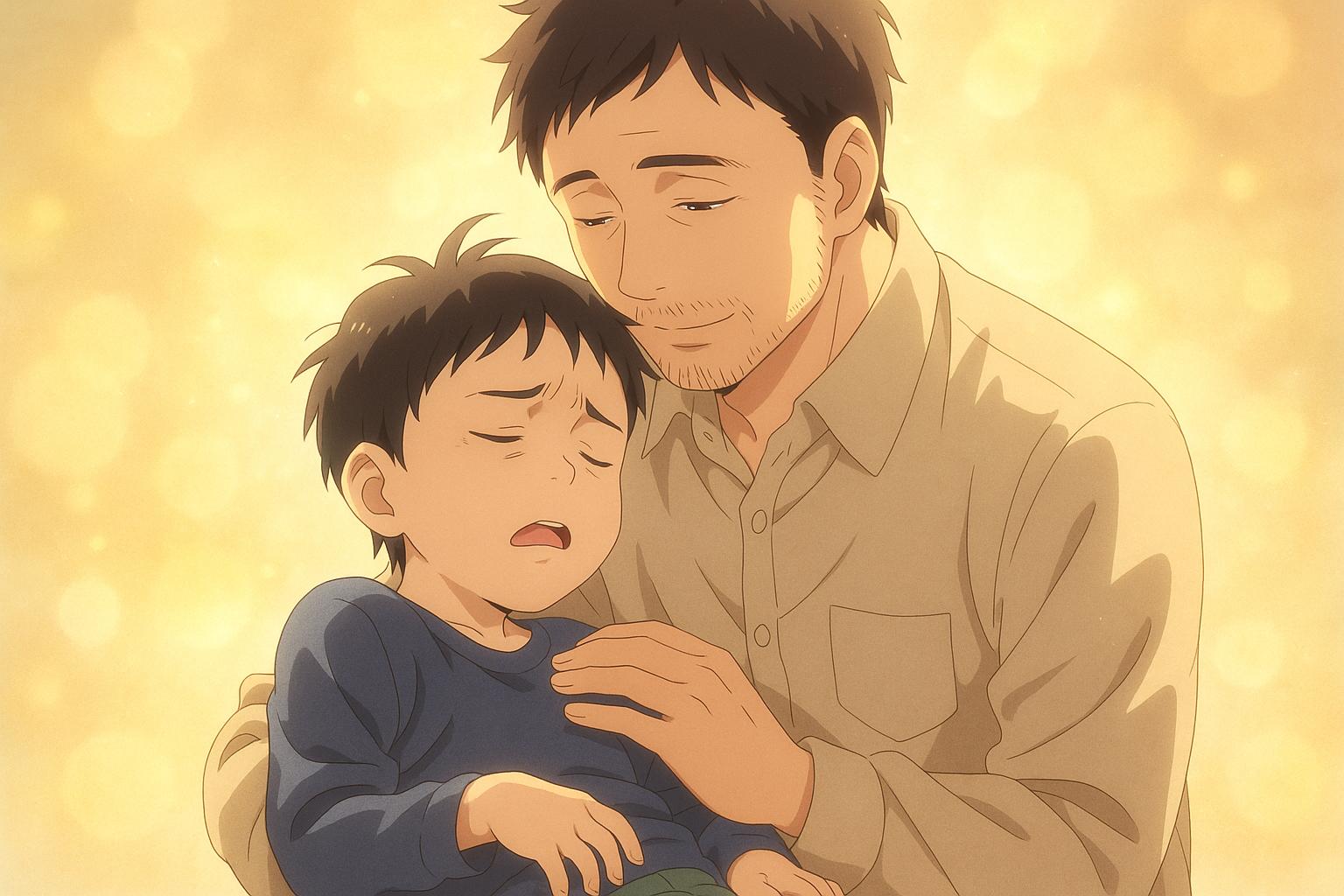Sir Ed Davey’s journey from orphaned childhood to Liberal Democrat leader is deeply marked by personal tragedy and a commitment to improving social care. Drawing on his experiences with his son’s rare neurological condition, Davey champions better support for carers and pushes for compassionate healthcare reforms, shaping his political vision and party resurgence.
The heartfelt handwritten letter from a dying father to his son, Edward, encapsulates an enduring love that transcends even the gravest circumstances. “Be clever and good and happy and a credit to Daddy always,” read the words penned by John Davey, who succumbed to Hodgkin disease shortly after writing. His son, better known today as Sir Ed Davey, the leader of the Liberal Democrats, reflects on the profound loss that surrounded his early years, including the passing of his mother, Nina, from breast cancer when he was just twelve.
In his memoir, Why I Care: And Why Care Matters, Davey candidly recounts the impact of familial tragedy on his character and values. Growing up as an orphan with his two older brothers after both parents’ untimely deaths, Davey has drawn upon these personal experiences to inform his political career and commitment to social issues, particularly health and care.
The trials of his upbringing laid the groundwork for Davey’s current role as a devoted father to his son, John, who has a rare, undiagnosed neurological condition. As a child, John struggled with basic motor skills and verbal communication, only uttering his first words at the age of nine. Today, under the loving care of both Davey and his wife, Emily, he has made remarkable strides, although his journey is fraught with challenges. “We never underestimate him,” Davey reflects, sharing moments of laughter and joy, emphasising the importance of fostering John’s development despite the hurdles.
Navigating the labyrinth of care for his son has highlighted significant gaps in support systems within the UK’s social care framework. Davey laments the financial burden that comes with specialised care, a reality he and Emily confront daily. Relying on his parliamentary income of £94,000 alongside Emily’s earnings, they are bolstered by the support of a close-knit community, acknowledging that, without financial assistance, many families would struggle to afford the necessary care for their loved ones. This resonates with his commitment to advocate for unpaid carers in Parliament, championing policies that ensure they receive both recognition and necessary support.
The Liberal Democrats have perceived a resurgence under Davey’s leadership, prompting him to reflect on the party’s previous shortcomings in connecting with voters. As he articulated in a recent interview, “We didn’t show we cared enough. We won’t make that mistake twice.” Coupled with his lived experiences, this acknowledgment informs his vision for the party, as he seeks to address pressing issues such as health and social care more effectively.
Davey’s empathetic approach extends to broader themes of healthcare reform, particularly issues involving the benefits system, as he has made clear during discussions around welfare policies. His encounters with bureaucracy, particularly for John’s disability benefits, have illuminated the need for a supportive system that doesn’t penalise those unable to work due to severe disabilities, underscoring his commitment to compassionate reforms.
Amidst a backdrop of personal and professional challenges, Davey finds himself at the helm of a political party navigating a tumultuous landscape marked by governmental changes. Discussions around assisted dying have taken centre stage, with the recent performances of the Labour and Conservative parties eliciting varied responses from the electorate. Drawing on his family history, he has expressed firm views against assisted dying legislation, arguing for a more nuanced understanding of palliative care that prioritises the patients’ emotional needs and their relationships with loved ones.
His strong Christian faith plays a significant role in shaping these views, as he wrestles with the moral implications that surround such deeply sensitive matters. As a practicing Anglican, Davey’s beliefs guide his commitment to advocating for quality care and the maintenance of life whenever possible, reflecting values instilled in him by his late parents.
While some might view his unconventional campaign strategies—engaging in humorous stunts from paddleboarding to bungee jumping—as gimmicky, Davey stands by his methods. “If Boris and Trump got attention doing fun things, why can’t I?” he asserts, turning what critics label as frivolous into a platform for substantive policy discussions. His method has undeniably paid off; he has led the party to its best election performance in a century.
Ed Davey’s journey is a mosaic of personal loss, professional commitment, and the deep-seated belief in the importance of care—in all its forms. As he continues to navigate the complexities of political leadership alongside the profound responsibilities of parenthood, his story serves as a resonant testament to the intersecting worlds of personal and public life, reminding us that political conviction is often rooted in our most intimate experiences.
Reference Map:
- Paragraphs 1, 2, 3, 4, 5, 7
- Paragraph 6
- Paragraph 8
- Paragraph 9
- Paragraph 10
- Paragraph 11
- Paragraph 12
Source: Noah Wire Services
- https://www.dailymail.co.uk/news/article-14722583/The-interview-change-mind-robotic-politicians-ED-DAVEY-opens-orphan-15-caring-profoundly-disabled-son-Westminsters-chief-jester-Andrew-Pierce.html?ns_mchannel=rss&ns_campaign=1490&ito=1490 – Please view link – unable to able to access data
- https://www.libdems.org.uk/news/article/ed-davey-pledges-to-be-voice-of-carers-as-he-opens-up-about-personal-experience-of-care – In this article, Liberal Democrat leader Ed Davey discusses his personal experiences as a carer for his severely disabled son, John, and his mother, Nina, who passed away from cancer. He emphasizes the challenges faced by carers and pledges to make care a central focus of the Liberal Democrats’ manifesto, aiming to be the ‘voice of carers’ in Parliament. Davey highlights the importance of supporting unpaid carers and ensuring they receive the recognition and assistance they deserve.
- https://www.theguardian.com/politics/2023/may/16/we-didnt-show-we-cared-enough-we-wont-make-that-mistake-twice-ed-davey-on-love-loss-and-the-lib-dems – Ed Davey reflects on the Liberal Democrats’ past shortcomings in demonstrating care and commitment to voters. He discusses personal experiences, including caring for his mother during her battle with cancer and now caring for his disabled son, John. Davey acknowledges the need to rebuild trust and emphasizes the party’s mission to challenge the Conservatives and address issues like health and social care, drawing from his personal experiences to inform his political approach.
- https://www.bigissue.com/news/politics/ed-davey-liberal-democrats-general-election-interview/ – In this interview, Ed Davey shares insights into his family’s experiences with the benefits system, particularly concerning his disabled son, John. He discusses the challenges of navigating the system and the emotional toll of detailing his son’s disabilities. Davey also addresses the Liberal Democrats’ stance on welfare reform, emphasizing the need for a supportive system that doesn’t penalize those unable to work due to severe disabilities, highlighting the party’s commitment to fair and compassionate policies.
- https://apnews.com/article/9c1da8665c4d3f66c8944800feaad9eb – This article covers Ed Davey’s unconventional campaign strategies during the 2024 general election, including engaging in humorous stunts like falling off a paddleboard and riding roller coasters. These activities aim to draw attention to serious issues such as sewage and healthcare reform while presenting the Liberal Democrats as a practical alternative to the major parties. The piece also touches on Davey’s personal experiences, including caring for his disabled son, to humanize his political image.
- https://news.sky.com/story/sir-ed-davey-we-felt-we-had-a-duty-to-talk-about-caring-for-our-disabled-son-13158142 – Ed Davey and his wife, Emily, discuss their decision to publicly share their experiences caring for their disabled son, John. They explain that revealing their personal story was a gradual process, driven by a sense of duty to highlight the challenges faced by carers. The article delves into their daily routines and the emotional aspects of caregiving, providing insight into their personal lives and the motivations behind their political commitments.
- https://www.telegraph.co.uk/politics/2024/06/25/watch-ed-davey-emotional-as-speaks-about-disabled-son-john/ – In this emotional interview, Ed Davey, the Liberal Democrat leader, discusses the profound impact of caring for his disabled son, John. He expresses concerns about the future and the challenges of ensuring John receives the best care possible. The article highlights Davey’s personal struggles and the deep bond between father and son, offering a poignant glimpse into his life beyond politics.
Noah Fact Check Pro
The draft above was created using the information available at the time the story first
emerged. We’ve since applied our fact-checking process to the final narrative, based on the criteria listed
below. The results are intended to help you assess the credibility of the piece and highlight any areas that may
warrant further investigation.
Freshness check
Score:
8
Notes:
The narrative includes recent references to Ed Davey’s current role and political activities, suggesting it is relatively fresh. However, some details may have been reported previously, affecting the novelty of the content.
Quotes check
Score:
8
Notes:
The narrative includes quotes from Ed Davey that appear original within this context, but without specific verification, it’s difficult to confirm if they have been used before.
Source reliability
Score:
6
Notes:
The narrative originates from the Daily Mail, which is a well-known publication but can vary in reliability depending on the subject matter and the specific journalist involved.
Plausability check
Score:
9
Notes:
The claims about Ed Davey’s personal life and political career are plausible and align with publicly available information. His experiences and political views are consistent with his known public persona.
Overall assessment
Verdict (FAIL, OPEN, PASS): PASS
Confidence (LOW, MEDIUM, HIGH): MEDIUM
Summary:
The narrative is largely plausible and fresh, with quotes that seem original. However, the source of the information is a mainstream outlet with variable reliability. Overall, the assessment is positive, though not without some caveats.













